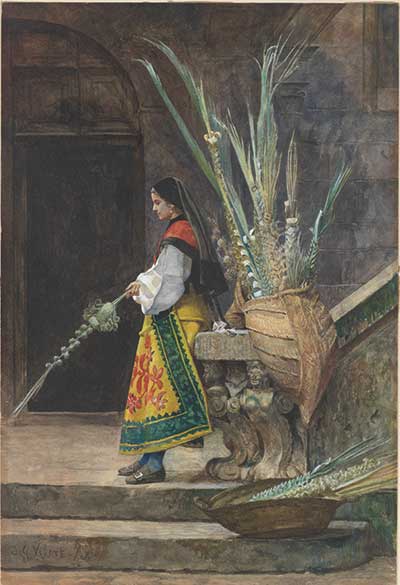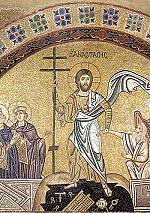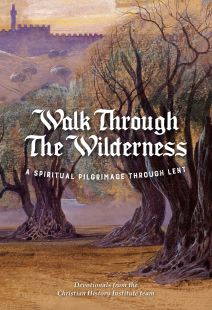Holy Week in Lent

[Jean-Georges Vibert, Palm Sunday in Spain—Catharine Lorillard Wolfe Collection, Bequest of Catharine Lorillard Wolfe, 1887 / [CC0] Wikimedia]
Palm/Passion Sunday
Hosanna! Blessed is the one who comes in the name of the Lord! Blessed is the coming kingdom of our ancestor David! Hosanna in the highest heaven!
(Mark 11:9b–10)
Let the same mind be in you that was in Christ Jesus, who, though he was in the form of God, did not regard equality with God as something to be exploited, but emptied himself, taking the form of a slave, being born in human likeness. And being found in human form, he humbled himself and became obedient to the point of death—even death on a cross.
(Philippians 2:5–8)
Monday in Holy Week
Be the cross our theme and story,
We who in the cross’s glory
Shall exult forevermore.
—Adam of St. Victor (12th c.), translated by John Mason Neale (1818–1866)
Adam of St. Victor says: The cross is our story.
In my own life, I’ve found that I hear the story of the cross so often I can become numb to it. But when you slow down to take it in, Adam’s claim is quite shocking. At the center of our faith is a story about God dying a brutal death at human hands. Our story is a story about God becoming just like us, even knowing the very worst of human suffering. Our story is about a God who gave us everything and identifies with the least of these.
How might this story strike you as you prepare to journey through Holy Week this year? Are you open to letting it surprise you or take on new life as you hear it again? Are you ready to claim with Adam: “Be the cross our theme and story”?
Paul writes in Philippians, “Let the same mind be in you that was in Christ Jesus.” Jesus who emptied himself and obeyed God even unto death. Jesus who rightfully had all the power and honor of being a member of the Trinity, yet gave it all up to become a lowly human being. We should have that kind of a mindset.
The cross isn’t just our story because we tell it year after year. The cross is our story because Jesus instructs us to take up our own cross and follow him. How might Jesus be asking you to follow him in this Holy Week? What kind of power or honor do you have that you might choose to give up rather than use to your own advantage?—Michelle Curtis
Tuesday in Holy Week
Life is long and full of crosses and we have need to look on Christ our pattern, to see how He bore His trials, and even to take example by His Apostles and saints if we would bear our own trials perfectly.
—Teresa of Ávila (1515–1582), The Interior Castle
The Two Messengers
Perhaps to the clear-eyed angel
There was nothing in the word he brought but glory:
Infinite splendor in a point of flesh,
Bursting, breaking through the veil of blood and mucus,
Passing through a narrow gate
To fill creation with redoubled light.
Only the old man, his rheumy eyes
Blurred with false hopes,
Back scarred by Roman rods,
Feet hard with trudging up the stony hill
To watch the heroes die,
Only he, perhaps, could taste in his body the sourness of the sweet word,
Could see the sword quivering in the stainless heart,
And know in what bitter way the glory comes.
—Edwin Woodruff Tait
Wednesday in Holy Week
The believing soul longs and faints for God;
she rests sweetly in the contemplation of Him.
She glories in the reproach of the Cross,
until the glory of His face shall be revealed.
—Bernard of Clairvaux (1090–1153), On Loving God
Probably best known today for hymns such as “O Sacred Head Now Wounded” and “Jesus, the Very Thought of Thee,” Bernard of Clairvaux was a formative figure in medieval devotion. A reforming monk of the Cistercian order, Bernard returned to the simplicity of the Rule of Saint Benedict, recruited participants for the Second Crusade in 1146, and in later life had so much power that he was the virtual pope of the Western church.
Throughout his career Bernard’s teaching focused on love—in a positive, personal vein, but not a sentimental one. Bernard emphasized the importance of the human Jesus for Christian spirituality. He referred to the New Testament portrait of Jesus, not merely as an example of a holy life, but as a picture of the divine action of love to change the hearts of human beings.
He also talked about the loving relationship between the self and God. Borrowing a good deal from Augustine, Bernard, in his treatise On Loving God, set forth four degrees of this love. He saw the self first of all loving only itself, then loving the neighbor and God for its own sake. Third, the soul comes to love God for God’s sake, normally the highest plane of love. But there is a fourth level, in which the soul loves itself for God’s sake. This is found only fleetingly on Earth but will be the constant state of the dead after the resurrection of the body.
Where are you on the journey to loving God this Holy Week?—Chris R. Armstrong
Maundy Thursday
For I received from the Lord what I also handed on to you, that the Lord Jesus on the night when he was betrayed took a loaf of bread, and when he had given thanks, he broke it and said, “This is my body that is for you. Do this in remembrance of me.” In the same way he took the cup also, after supper, saying, “This cup is the new covenant in my blood. Do this, as often as you drink it, in remembrance of me.” For as often as you eat this bread and drink the cup, you proclaim the Lord’s death until he comes.
(1 Corinthians 11:23–26)
Good Friday
Were you there when they crucified my Lord?
Oh, were you there when they crucified my Lord?
Oh, sometimes it causes me to tremble, tremble
Were you there when they crucified my Lord?
—Traditional Black spiritual
What a supreme paradox. We now call the day Jesus was crucified, Good.
Many believe this name simply evolved, as language does. They point to “God’s Friday” as its root. This seems reasonable, given that “goodbye” evolved from “God be with you.” Whatever its origin the current name of this holy day offers a fitting lesson to those of us who assume that “good” must mean “happy.”
The church has always understood that the first Good Friday was anything but happy. Sadness, mourning, fasting, and prayer have been its focus since Christianity’s early centuries. A fourth-century church manual, the Apostolic Constitutions, calls Good Friday a “day of mourning, not a day of festive Joy.” Ambrose, the archbishop who befriended Augustine, called it the “day of bitterness on which we fast.”
Many Christians have historically kept their churches unlit or draped in dark cloths on this day. Processions of penitents have walked in black robes or carried black-robed statues of Christ and the Virgin Mary. And worshipers have walked the Stations of the Cross, praying and singing their way past 14 images representing Jesus’s steps along the Via Dolorosa to Golgotha.
Yet, despite—indeed because of—its sadness, Good Friday is truly good. Its sorrow is a godly sorrow. In the midst of consumerism’s Western playground, Good Friday calls to a jarring halt the sacred “pursuit of happiness.” The cross reveals this pursuit for what it is: a secondary thing. To pursue happiness we must first experience sorrow. He who goes forth sowing tears returns in joy.
Good Friday has always challenged mere human goodness. Its sad commemoration reminds us that in the face of sin, our goodness avails nothing. Only One is good enough to save us. That he did so is cause indeed for celebration. —Chris R. Armstrong
Holy Saturday
For there is hope for a tree, if it is cut down, that it will sprout again, and that its shoots will not cease. Though its root grows old in the earth, and its stump dies in the ground, yet at the scent of water it will bud and put forth branches like a young plant. But mortals die, and are laid low; humans expire, and where are they? As waters fail from a lake, and a river wastes away and dries up, so mortals lie down and do not rise again; until the heavens are no more, they will not awake or be roused out of their sleep. Oh that you would hide me in Sheol, that you would conceal me until your wrath is past, that you would appoint me a set time, and remember me! If mortals die, will they live again? All the days of my service I would wait until my release should come.
(Job 14:7–14)
When it was evening, there came a rich man from Arimathea named Joseph, who also was himself a disciple of Jesus. He went to Pilate and asked for the body of Jesus; then Pilate ordered it to be given to him. So Joseph took the body and wrapped it in a clean linen cloth and laid it in his own new tomb, which he had hewn in the rock. He then rolled a great stone to the door of the tomb and went away. Mary Magdalene and the other Mary were there, sitting opposite the tomb.
(Matthew 27:57–61)
By CHI Staff and Associates
[Christian History originally published this article in Christian History Issue #143+ in 2022]
Next articles
Day 1. A Lantern for the Stable
The shepherds laid aside their plans and chose to present themselves to Emmanuel.
Diana Pavlac GlyerDay 2. Loving Others Through Prayer
Why should my prayer be powerless to help another?
Robert TrexlerSupport us
Christian History Institute (CHI) is a non-profit Pennsylvania corporation founded in 1982. Your donations support the continuation of this ministry
Donate






